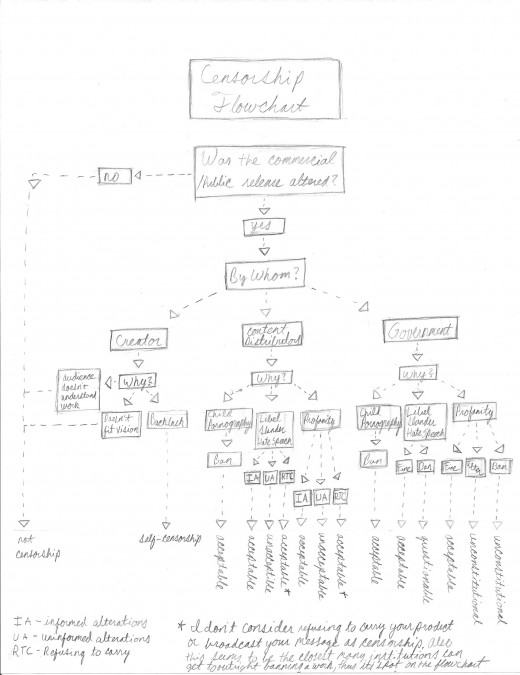Censorship and You
In the hustle and bustle of the average American's life, censorship likely feels like a distant problem. At least it did for yours truly. After all, censorship is a serious problem that only happens under oppressive regimes. Censorship is extreme government level suppression of important information. It’s totally bad and something that we presently don’t have to worry about, right?
Well…..not quite.
So What Is It?
Confession time: I had never really taken the time to sit down and try to sort through the concept of censorship. I had pondered individual cases, but I hadn’t given the same amount of time to the concept as a whole. A recent string of game development related controversies and, ultimately, a comic by Kukuruyo (Alejandro Ricondo) got me to stop and reconsider my ideological apathy. The first step in doing so was to examine the definition.
Wikipedia defines censorship as “the suppression of speech, public communication or other information which may be considered objectionable, harmful, sensitive, politically incorrect or inconvenient as determined by governments, media outlets, authorities or other groups or institutions”. They note that indirect censorship, which is prevalent in multiple forms of media, is known as “soft censorship” and that if a content creator does this to their own works, it’s known as “self censorship”. The ACLU defines censorship much the same way, noting that individuals or groups organizing things such as boycotts is protected under the 1st amendment.
What stands out about those definitions is how broad they are. Anything short of someone changing their work purely because it doesn’t tickle their fancy any more can be labeled as censorship. That would mean censorship is much more prevalent than initially assumed and largely because it can occur at the hands of any institution or individual - not just the government. Removing a skimpy outfit from a video game is just as much an act of censorship as internet blackouts in a country in the throes of civil unrest.
I may have subconsciously defined both as “censorship”, but I never put two and two together and considered them as two entries in the same category. Apparently, I had been missing the forest for the trees. Ultimately it isn’t the degree of alteration or suppression that defines the censorship threshold, but rather, who’s making it and why.
Really Now. So What Does It Look Like, Then?
Using that definition, let's take a look at some of the recent game development controversies and see how they fare.
Dead or Alive Xtreme 3: Self Censorship - Tecmo hasn’t planned for a NA release as they are expecting it to be poorly received, or even panned due to its supposed sexualized presentation of women .
Street Fighter V: Inconclusive- Capcom has stated that no third party spurred the camera angle changes to R. Mika’s Critical Art and Cammy’s intro. Some suspect an attempt to avert male gaze, which the changes appear to do. The presence of further content, such as Laura’s intro, which don’t, imply otherwise.
Fire Emblem Fates: Self Censorship - Nintendo of America had restraints added to whom was eligible for the face rubbing/petting mechanic.

So What Of It?
Sorting through what defines censorship and making peace with that was definitely a paradigm shift. However, that paradigm shift felt hollow and underwhelming.
But why? Censorship is a big deal, right? I should be more incensed by its prevalence. Have I become one of the sheep? Juliet might have the best explanation for this cognitive dissonance: a rose by any other name would smell just as sweet. All I had done was relabel phenomena I was familiar with. I’ve seen enough censorship in media to come to the conclusion that not all instances of censorship are created equal.
And that’s why I’ve found some of the discourse that surrounds it to be hollow as well. Often, it seems, claims of censorship are presented with all the self assurance you’d expect of someone who has caught their opponent employing a logical fallacy and received with all the reverence someone might muster for an exclamation of “U MAD, BRO?”. That’s to say, quibbling about whether a content change counts as censorship, especially in relation to entertainment media, is where discourse on free expression goes to die.
I’d posit that this happens because censorship is somewhat of a pejorative term. People can wield claims of censorship like weapons while others outright deny it because of its negative connotations. Everyone gets hung up on what should be the easiest part of the equation, identifying it, and never moves on to applying a litmus test to determine whether this instance of it is bad because they’re already so sure.

I whipped up a little flowchart to reflect some of my thoughts on some common instances of censorship. The gist of it is that the government should engage in little to no direct censorship.
Third parties censoring content is generally acceptable, as long as everyone involved is aware of how it will work and, even begrudgingly, accepts or is given the chance to take their message elsewhere. Refusing to carry one’s work or present the message at all is fine as well. Performing alterations to a work or message of your own volition without first consulting the content creators that have tasked you with presenting it is a big no no, as that’s dishonest.
I don’t consider it self-censorship if you change your work in pursuit of your vision, whether the push to do so is internal or external. If you’ve fully followed your vision and the audience has interpreted properly, but they just don’t like it, then changing it to remedy that is self censorship as far as I'm concerned. While I may feel that some cases of this is acceptable, how I feel about any given case of this will ultimately depend upon the details of that situation. Also, censorship of things already deemed worthy exceptions to the “no governmental censorship” rule such as libel, slander, hate speech, child pornography, etc. is fine in my book.
What Did We Learn Today?
The party that is performing the alteration and their reasons for doing so are the most important factors in determining whether censorship has occurred or not. The degree of, and rationale for, alteration will determine how moral said censorship is.
If we want a rich and diverse cultural landscape, we have to give people the space to present a multiple of varying ideas and opposing views. But most freedoms are abridged in some way simply because we need ground rules to maintain civility and keep one free expression from crowding out another.
The propensity for shutting out expression entirely increases with the power and influence of the individual or institution involved. So while I think that the notion that censorship can only occur at the hands of the government is misguided, there is a salient nugget of logic in it that isn’t. Individuals and institutions have limited power to directly censor you. The government, on the other hand, is the big boy on the block. They DO have that kind of power. So when the government starts widely and brazenly censoring expression, you’ve reached proverbial DEFCON 3.
So some of my ideas changed , while others didn’t. I’m sure I’ve only scratched surface and am eager to hear everyone’s thoughts on the matter. After all, that’s how we learn and grow.








